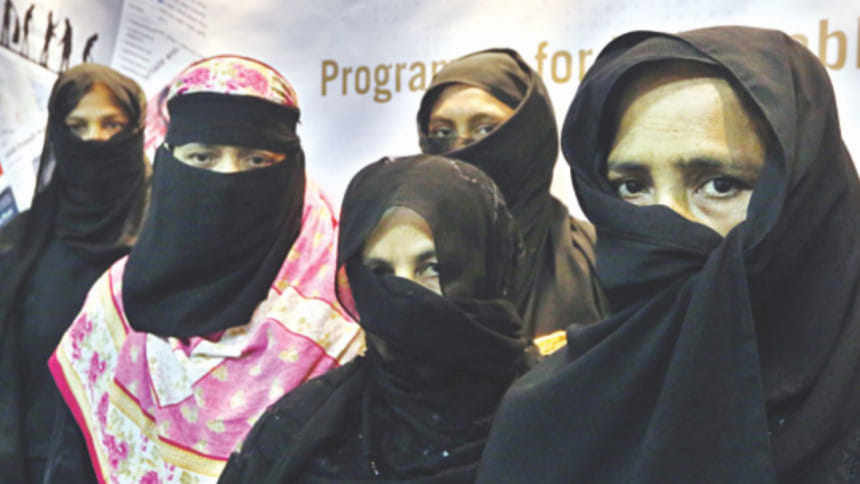'No one by their side'

Rahima Begum returned to Dhaka from Saudi Arabia on March 21 with nothing but the scars and memories of the torture back in Riyadh. Her husband, refusing to accept her back, had left.
She is currently undergoing treatment with support from Brac, under its migration programme.
The non-government organisation recently began an emergency support programme to address the needs of an increasing number of female migrant workers' returning home from the Middle East, supported by The Leathergoods and Footwear Manufacturers and Exporters Association of Bangladesh
“When they arrived here in the middle of the night, they found no one by their side. Some didn't have money for food or transport to go home,” said Shariful Islam Hasan, head of the migration programme, at an event organised yesterday at Brac Centre in the capital's Mohakhali.
The programme was aimed at drawing attention to the plight of the returning female migrant workers who were physically and sexually abused by their employers in Saudi Arabia and other Middle Eastern countries.

During a tearful address, Sarabon Begum, migrant worker from Jessore, recalled how her employer once beat her unconscious for refusing to eat stale food.
“Our stories of torture are so harrowing that we won't be able to tell [them]. Many women are tortured and abused. I request you, beg you to bring them back,” she said at the programme.
When Sarabon contacted her family, they spent Tk 1.5 lakh to bribe authorities and agents in an attempt to bring her back.
Instead, she was left abandoned on the streets of Riyadh from where police took her to a safe home. After reaching out to Brac, she finally returned.
Sarabon was among the 360 women who returned from Saudi Arabia in less than a month. All of them had been given shelter at Riyadh immigration camp before they flew home, according to a press release issued by Brac.
Although most returned empty-handed, all of them brought back harrowing tales of abuse.
Johura Akhter endured months of torture before she fled to the immigration camp in Riyadh. She returned on May 19.
Once back home, she thought the suffering had ended. But she was thrown out by her in-laws.
“I am in no less agony now; at the mercy of my siblings,” Johura said.
“I went abroad thinking of my two daughters' future. Now I have nothing. Please stop the brokers and agents from sending us abroad.”
Saiful Islam, president of the footwear manufacturers association, said no Bangladeshi woman should be sent abroad to work as domestic help.
“If businesses from all sectors come forward, these women [who have returned] can be absorbed into them.”

The association signed a memorandum of understanding with Brac yesterday on providing financial assistance to 20 women returnees and skill development for another 50 for their placement in the footwear industry.
Speaking as the chief guest, Kazi Reazul Haque, chairman of National Human Rights Commission, said, “The government is legally obligated to protect the rights of each and every citizen.”
Instead of sending domestic workers, Bangladesh should train workers so they can apply for skilled migration, where workers' rights and interests are protected, he added.
According to estimates by Brac Migration Programme, every month between 300 and 400 female migrants return from the Middle East, mostly Saudi Arabia, after being tortured.
Estimates by the expatriates welfare and overseas employment ministry show some six lakh Bangladeshi women are put to work in the Middle East, mostly in Saudi Arabia, United Arab Emirates, Lebanon, Jordan and Oman.
[The Daily Star is not using the real names of the women migrant workers to protect their identity.]

 For all latest news, follow The Daily Star's Google News channel.
For all latest news, follow The Daily Star's Google News channel. 





Comments